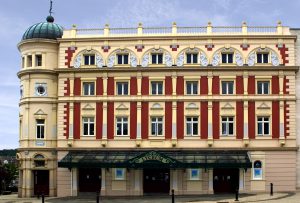
Today, it seems inconceivable that Sheffield’s beloved Lyceum Theatre could ever have been considered for demolition.
But such a drastic move was very much on the cards when the theatre fell into disrepair in the early 1980s as it struggled against the rising tide of television and other forms of entertainment. It could have become a nightclub, a cabaret venue or, if the city council of the day had had its way, a multi-storey car park.
Sheffield once boasted no fewer than eight theatres, and the Lyceum was built at the turn of the last century and at the dawn of the Edwardian era by the famous Victorian theatre architect W.G.R. Sprague. It is the only surviving example of his work outside London.
In its early days the Lyceum played host to Sir Henry Irving, the greatest actor of the Victorian age and the first ever to be knighted (although he was to die suddenly in 1905 when he collapsed in Bradford, having uttered his last stage words “Into Thy hands, O Lord”).
As the theatre enjoyed a golden period, other famous names to appear there included Anna Pavlova and Charlie Chaplin and, in the 1940s, Sir Donald Wolfit and Noël Coward. In the following decades, big names such as Morecambe and Wise and Albert Finney assured full houses.
But the final curtain came down in 1968 following a pantomime starring Vince Hill. The building was listed in 1974, briefly became a bingo hall, and finally closed in 1979.
Enter stage right David Heugh, our speaker, whose background is in sales and marketing, and his associate Norman White, a Sheffield solicitor.
They launched a campaign to save the Lyceum, and last December marked the 25th anniversary of the theatre’s reopening in 1990 following a £14 million refurbishment which safeguarded the Lyceum’s future as a home for touring productions. A lunch at the Cutlers’ Hall organized by the Lyceum Trust, of which David is chairman, marked the anniversary.
Before the Lyceum rescue, David had been chairman of South Yorkshire Opera, which at the time was the biggest amateur operatic company in the country.
David and Norman were hands-on opera enthusiasts, and they had just persuaded Prince Charles and Princess Diana to come to Sheffield to see South Yorkshire Opera’s production of Tosca at the adjacent Crucible Theatre in 1984 when the receivers asked if the pair wanted to save the Lyceum.
“The very next day I received a phone call from KPMG [the accountancy firm] and they asked me if I knew the building was empty, pointing out that it would make a fine home for my company,” recalled David.
“When we went to look at it, the theatre was dark and cold, with no seats, water coming through the roof, water in the cellar and pigeons in the upper rooms, but we were still impressed by the atmosphere of this great theatre.
“Bingo had carried on after 1968, and pop concerts were later put on, but they never paid their bills and they went into receivership.”
David and Norman managed to secure a meeting with David Blunkett, then the leader of Sheffield council, and although a grant of £71,000 was eventually approved – after he had turned down their initial request – this was not enough to purchase the Lyceum.
“At the time, it looked as though the battle was lost,” David added. “We really needed more like £170,000.”
However, in October 1985, with the building just an hour away from being sold to the highest bidder, late night negotiations with the RBS bank resulted in the pair managing to borrow £30,000, and the combined total was enough to see off the competition.
The Lyceum Theatre Trust was formed soon after, quickly gaining further members, and fundraising began for a modest £5 million refurbishment.
But far greater financial security for the theatre came about when Sheffield was awarded the 1991 World Student Games. David remembers: “David Blunkett called us back in and said Sheffield would be getting the games and a renovated Lyceum could be a star in the centre of the city. This would widen the trust’s remit and the council’s involvement would then ensure local, national and EEC support.”
The decision paid off and led to the wider £14 million refit – the biggest theatre refurbishment in Europe at the time.
A concert by the D’Oyly Carte Opera Company took place on the opening night, December 10 1990 and the rest, as the saying goes, is history.
David Heugh has had a varied and successful career as a businessman, entrepreneur and charity fundraiser, and has had stints as chief executive of the Whirlow Hall Farm Trust and as director of fundraising at Freeman College, which provides day and residential education and care in South Yorkshire for young people with special educational needs and disabilities.
He won the Sheffield Business Person of the Year Award in 2008, but says that his greatest legacy is his ‘David and Goliath’ battle to buy and save the Lyceum.
